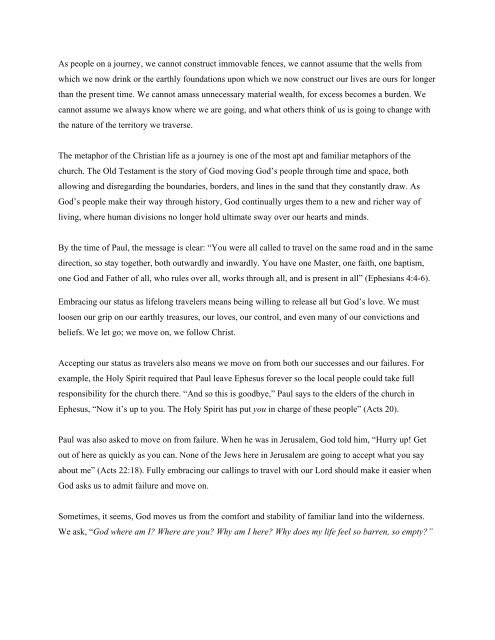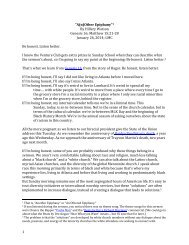2012-09-09 Journeying with Paul (Leslie Hawthorne Klingler).pdf
2012-09-09 Journeying with Paul (Leslie Hawthorne Klingler).pdf
2012-09-09 Journeying with Paul (Leslie Hawthorne Klingler).pdf
You also want an ePaper? Increase the reach of your titles
YUMPU automatically turns print PDFs into web optimized ePapers that Google loves.
As people on a journey, we cannot construct immovable fences, we cannot assume that the wells from<br />
which we now drink or the earthly foundations upon which we now construct our lives are ours for longer<br />
than the present time. We cannot amass unnecessary material wealth, for excess becomes a burden. We<br />
cannot assume we always know where we are going, and what others think of us is going to change <strong>with</strong><br />
the nature of the territory we traverse.<br />
The metaphor of the Christian life as a journey is one of the most apt and familiar metaphors of the<br />
church. The Old Testament is the story of God moving God’s people through time and space, both<br />
allowing and disregarding the boundaries, borders, and lines in the sand that they constantly draw. As<br />
God’s people make their way through history, God continually urges them to a new and richer way of<br />
living, where human divisions no longer hold ultimate sway over our hearts and minds.<br />
By the time of <strong>Paul</strong>, the message is clear: “You were all called to travel on the same road and in the same<br />
direction, so stay together, both outwardly and inwardly. You have one Master, one faith, one baptism,<br />
one God and Father of all, who rules over all, works through all, and is present in all” (Ephesians 4:4-6).<br />
Embracing our status as lifelong travelers means being willing to release all but God’s love. We must<br />
loosen our grip on our earthly treasures, our loves, our control, and even many of our convictions and<br />
beliefs. We let go; we move on, we follow Christ.<br />
Accepting our status as travelers also means we move on from both our successes and our failures. For<br />
example, the Holy Spirit required that <strong>Paul</strong> leave Ephesus forever so the local people could take full<br />
responsibility for the church there. “And so this is goodbye,” <strong>Paul</strong> says to the elders of the church in<br />
Ephesus, “Now it’s up to you. The Holy Spirit has put you in charge of these people” (Acts 20).<br />
<strong>Paul</strong> was also asked to move on from failure. When he was in Jerusalem, God told him, “Hurry up! Get<br />
out of here as quickly as you can. None of the Jews here in Jerusalem are going to accept what you say<br />
about me” (Acts 22:18). Fully embracing our callings to travel <strong>with</strong> our Lord should make it easier when<br />
God asks us to admit failure and move on.<br />
Sometimes, it seems, God moves us from the comfort and stability of familiar land into the wilderness.<br />
We ask, “God where am I? Where are you? Why am I here? Why does my life feel so barren, so empty?”




